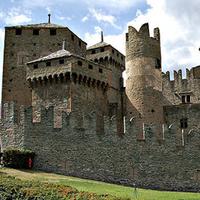9. Com’era una festa in un castello
how it was|||||
9. Wie eine Party in einem Schloss aussah
9. How was a party in a castle
9. A quoi ressemblait une fête dans un château
9. Hoe een feest in een kasteel was
9. Como era uma festa num castelo
9. Hur det var en fest i ett slott
Nei periodi di pace erano molto rumorose.
in the|periods|||||noisy
Ciò che mangiavano dipendeva dal periodo della storia, dal periodo dell'anno e in quale paese si trovavano.
||they ate|it depended|||||||||||||
Ma nonostante questo, in qualsiasi festa, una cosa certa è che non mancavano mai le bevande, le risate e gli schiamazzi.
|despite|||||||certain||||they were missing|||drinks||laughter|||noises
Pero a pesar de ello, en cualquier fiesta lo que sí es cierto es que nunca faltaron las bebidas, las risas y los ruidos.
Solitamente si mangiava nella sala più grande.
Gli ospiti più importanti ed i nobili sedevano al tavolo principale o tavolo alto con il “lord” e la “lady”.
|||||||they sat||||||||||||lady
Coloro che avevano meno importanza sedevano su tavoli bassi di fronte a loro che, in realtà, erano formati da assi di legno poggiate su dei supporti.
||||||||low|||||||||formed||boards|||placed|||supports
Those who had less importance sat at low tables in front of them which were actually made of wooden planks resting on supports.
Los de menor importancia se sentaron en mesas bajas frente a ellos que, en realidad, consistían en tablas de madera apoyadas sobre soportes.
I servi e i contadini non erano invitati alle feste del castello.
|you served||||||invited||||
The servants and peasants were not invited to the castle feasts.
I nobili normalmente mangiavano pesce di venerdì e carne salata in inverno.
||||||Friday|||salted||
The nobles normally ate fish on Fridays and salted meat in winter.
La carne veniva conservata sotto sale in autunno in modo da poter durare a lungo.
|||preserved|||||||||to last||
Il cibo si cucinava nelle cucine.
|||it was cooked||
Food was cooked in the kitchens.
In alcuni castelli si usavano capannoni nel cortile.
|||||sheds||
Le verdure venivano bollite, mentre la carne era arrostita su degli spiedi davanti a degli enormi camini accesi.
|||boiled|||||roasted|||skewers|||||fireplaces|I lit
Il grasso che colava dalla carne veniva raccolto per poi essere spalmato su pezzi di pane.
|||it was dripping||||collected||||spread||||
The fat that dripped from the meat was collected and then spread on pieces of bread.
Molte persone utilizzavano fette di pane secco al posto dei piatti e alla fine del pasto venivano date ai poveri.
|people|they used|slices||||in the||||||||||given||poor
Many people used slices of dry bread instead of plates, and at the end of the meal they were given to the poor.
Le persone mangiavano soprattutto con le mani e usavano i coltelli, ma non le forchette, sebbene fossero già state inventate.
||||||||||knives|||||although|they were|||invented
I rifiuti venivano gettati per terra e i cani erano soliti cibarsi degli avanzi che trovavano sui pavimenti.
|waste|they came|you were thrown||||||||to feed themselves||||||floors
The rubbish was thrown on the ground and the dogs used to eat the leftovers they found on the floors.
C'erano anche periodi di carestia e questo accadeva quando i raccolti non crescevano a causa del brutto tempo; la carestia poteva essere anche causata dai nemici della gente che distruggevano le loro riserve di cibo.
||||famine||||||crops||they grew||||ugly|||||||caused||||||they destroyed|||reserves||
There were also periods of famine and this happened when the crops did not grow due to bad weather; famine could also be caused by people's enemies destroying their food reserves.

